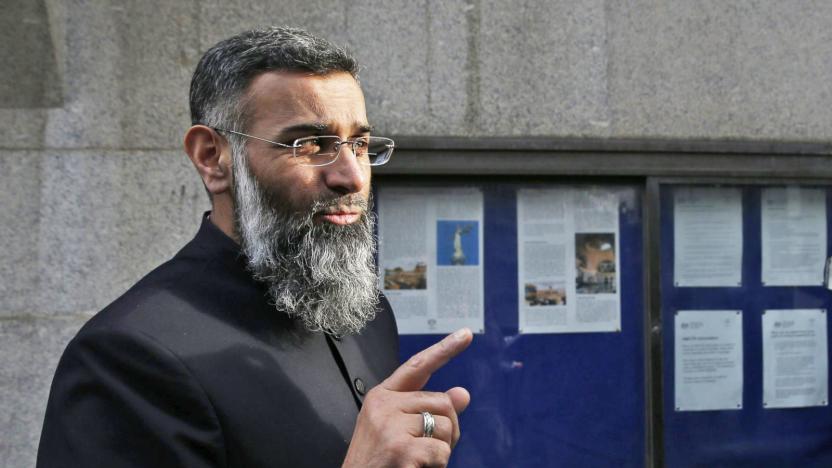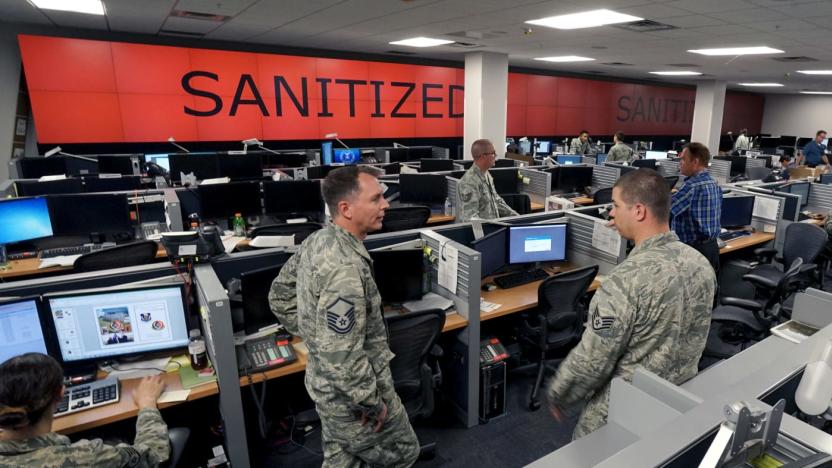islamicstate
Latest

Hacker faces 20 years in prison for helping ISIS
The US just broke new ground in its bid to fight pro-terrorist hackers. A judge has sentenced Kosovo citizen Ardit Ferizi to 20 years in prison for hacking a US company in order to collect information about 1,300 government and military personnel and help ISIS create a hit list. It's the country's first conviction for terrorism-related hacking, according to Assistant Attorney General John Carlin. Ferizi pleaded guilty on June 15th, roughly 8 months after Malaysian police arrested him on the US' behalf.

Twitter and YouTube wouldn't delete an extremist cleric's posts (update: gone)
Internet giants have been increasingly willing to take down extremist content, but their previous reluctance is coming back to haunt them. The UK recently convicted radical cleric Anjem Choudary (and co-defendant Mohammed Rahman) of rallying support for ISIS, and court documents have revealed that neither Twitter nor YouTube agreed to take down key content. Twitter hasn't deleted his account, for example, despite British law enforcement's claims that it violates Twitter policies on promoting terrorism -- even after he was arrested in September 2014. It pulled Rahman's, but not in sync with an official request.

Twitter was quick to pull extremist tweets following Nice attack
Twitter's response to online extremism has changed a lot in the past few years. Observers at observer groups like the Counter Extremism Project report that the social network was exceptionally speedy in removing pro-extremist accounts and tweets in the hours following the truck attack in Nice, France on July 14th. It moved with "swiftness we have not seen before," CEP says. Twitter hasn't commented on the specific actions, but it's apparent that the company is serious about its ban on terrorism.

ISIS' Twitter traffic reportedly dropped 45 percent in 2 years
If you ask the US government, the efforts to stifle ISIS' online propaganda are paying off. The White House reports that the extremist group's Twitter traffic has dropped 45 percent in the past 2 years, owing to both attempts to keep accounts offline and a surge of countering messages. To some extent, it was just a matter of getting up to speed. Officials admit that they made mistakes early on in fighting ISIS' online messaging (such as producing a lot of opposing statements in Engilsh), but they say they've both made more relevant content and done a better job of coordinating internet campaigns with its military strategy.

ISIS worries that fake Android apps are spying on its ranks
ISIS' attempts to disseminate its extreme message through mobile apps might be backfiring. Motherboard has learned that the group is warning members of fake, malware-laden versions of its Android apps that allegedly spy on users. While it's not clear who's creating the apps (besides "dubious sources"), it's implied that at least one government is trying to snoop on ISIS through unsuspecting members. Those militants can't just stick to 'official' sources to be safe, either -- ISIS' official channels frequently go down, so many of those backing the group's hateful cause have no choice but to go through unofficial routes.

US launches its first cyberattacks against ISIS
The US no longer thinks that it's enough to hurt ISIS through airstrikes and cutting off propaganda channels -- it's starting a full-on digital warfare campaign. Cyber Command is launching its first attacks against ISIS' digital infrastructure in a bid to disrupt its communications and other basic functions. According to New York Times sources, this includes everything from imitating commanders to interrupting payments to fighters. This, in turn, could slow down ISIS as it second-guesses its moves for fear of being led into an American trap.

ISIS' online presence reportedly includes a 24-hour 'help desk'
The terrorist group known as ISIS has ramped up its online outreach efforts in a big way over the past year, including establishing a 24-hour help desk that teaches members how to use encryption and other secure communications tactics, NBC News reports. News of the help desk comes from Dr. Aaron Brantly, a cyber fellow at the Combating Terrorism Center with the US Military Academy at West Point. According to Brantly, ISIS has "developed a series of different platforms in which they can train one another on digital security to avoid intelligence and law enforcement agencies for the explicit purpose of recruitment, propaganda and operational planning."

US prosecutes man who hacked identities to help ISIS
Extremism and terrorism are complex things in the internet era, and US federal prosecutors are learning this first hand. The Justice Department recently charged Kosovo citizen Ardit Ferizi with leading a hacking team that swiped the personal data of US military staffers in order to help Islamic State in Iraq and Syria (ISIS) supporters kill as many as 1,000 Americans. That campaign hasn't panned out, as you might have guessed, but it makes the consequences of a typical data breach look timid by comparison.

Europol pledges to take down ISIL's social media accounts within two hours
Europol has announced that it's setting up a taskforce just to deal with Islamic State's social media accounts. In an interview with The Guardian, director Rob Wainwright pledged that officers would be trying to take down each account within two hours of being discovered. ISIL is believed to control upwards of 50,000 Twitter accounts, and uses that site, as well as Facebook and YouTube, to recruit new followers. In addition, the group uses social media to spread propaganda and issue death threats -- such as the one against Twitter's leadership, including co-founder Jack Dorsey.


